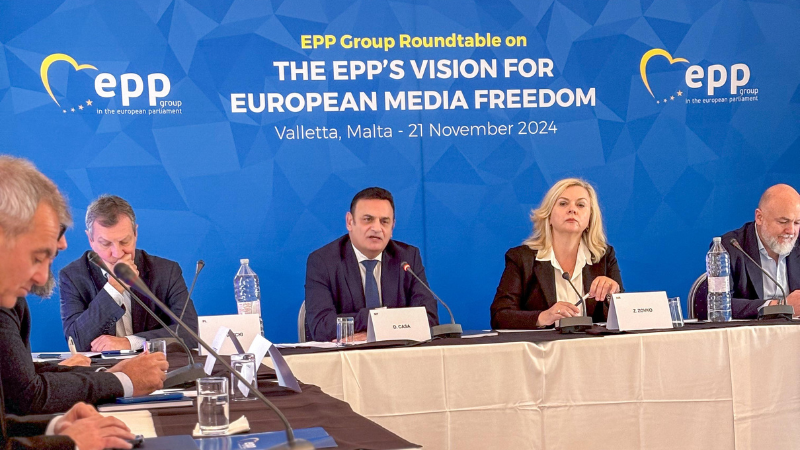Recently re-elected MEP within the EPP Group in the European Parliament, David Casa continues to stand as one of Malta’s most enduring political figures, a guardian of justice and a staunch advocate for media freedom.
During his visit to Malta this week, where 150 EPP delegates convened for the party’s political assembly hosted by the PN for the first time, Casa spoke to The Shift about his motivations, challenges, and ambitions in an exclusive interview.
‘It’s a privilege to serve’
“Thank you for having me,” Casa, the PN’s Head of Delegation within the EPP Group in the European Parliament, begins with his characteristic warmth. “Yes, going into my fifth term places me among the most experienced members in parliament, but there are a few colleagues who have served as long, if not longer.”
He pauses, weighing his words. “It’s been a privilege to represent the Maltese people for so many years. My goal remains the same – to work relentlessly in their best interest.”
Casa’s tenure has been marked by his long-standing membership in committees on employment, social affairs, and economic matters. Yet, he acknowledges that his focus has sharpened within this term.
“What’s different now is my role on the Justice and Civil Liberties Committee. It’s where decisions about the rule of law are made – an area I committed to placing at the heart of my work. This is not just a promise; it’s a responsibility.”
Fight for the rule of law
The conversation naturally turns to Casa’s impassioned advocacy for the rule of law, a cause that has become deeply personal for him since the assassination of journalist Daphne Caruana Galizia in 2017.
“Without the rule of law, we are not truly free,” he states. “Daphne’s murder was the most extreme example of what happens when power goes unchecked. But beyond that tragedy, we’ve seen how a culture of impunity corrupts society. Even Labour supporters have suffered under the so-called disability racket, where powerful fixers exploited their vulnerable followers for personal gain. It’s the weakest who pay the highest price in a broken system. Malta deserves better – Labour supporters included.”
When asked about criticism from his political opponents, Casa is dismissive. “My job is to defend the Maltese people, not corrupt politicians who betray them. Labour’s attacks on me are laughable – a desperate attempt to divert attention from scandal after scandal. I’ve stopped listening to their nonsense, and I suspect most people have, too.”
Taking on corruption in Europe
Casa has not confined his fight against corruption to Malta. In the European Parliament, he was chosen to lead negotiations on a landmark anti-corruption directive. “This directive will set minimum standards on criminal law across EU member states,” he explains.
“It’s about closing legal loopholes that allow corrupt politicians and public officials to abuse their power. Corruption doesn’t just undermine democracy; it robs citizens of their rights. I’m determined to see this law enacted and enforced.”
The process of shaping European legislation is rarely straightforward, and Casa has spent the past months navigating the hearings of new European Commission nominees.
“Broadly speaking, the nominees have demonstrated the competence required for their roles,” he says. “But I used this time to ensure Maltese concerns were heard, particularly when speaking to the Commissioner-designate responsible for the rule of law.”
He notes ongoing controversies, such as those surrounding the appointment of the Spanish nominee Teresa Ribera, whose appointment has now been approved. “There are questions about her handling of the floods in Valencia. However, we need stability to tackle pressing issues.”
Road ahead for Malta
When asked about his hopes for Malta over the next five years, Casa is candid. “We’d be here all week if I had to list everything,” he says, before highlighting two urgent priorities.
“First, we need to fix the broken court system. It’s outrageous that Yorgen Fenech’s trial still hasn’t started. Delays in justice are unfair to victims’ families and undermine public trust. Civil proceedings are no better -expensive, interminable, and inaccessible to ordinary people. Justice must be swift, fair, and affordable.”
“Second, the power to conduct surveillance on citizens needs to be taken out of politicians’ hands. Ministers in this government cannot be trusted with such authority. Surveillance decisions should be the domain of independent courts.”
Defender of press freedom
Casa’s passion for media freedom was also on full display during a roundtable hosted by the European People’s Party (EPP) in Valletta this week, where he called on the Maltese government to “properly transpose Daphne’s Law.”
The directive, which Casa describes as one of the EPP’s landmark achievements, aims to protect journalists across Europe from abusive lawsuits, commonly known as SLAPPs (Strategic Lawsuits Against Public Participation).

(Left to right) David Casa, Eve Borg Costanzi, Caoilfhionn Gallagher, Charlie Holt, Maria Ordzhonikidze, and Caroline Muscat addressed the first panel during an international conference on press freedom organised in Malta in 2023.
“Journalists are the backbone of democracy,” Casa states. “The Maltese government’s half-hearted transposition of Daphne’s Law is a disservice to journalists and citizens. It’s a tick-box exercise that ignores key recommendations from the European Commission. We need stronger protections against domestic SLAPPs, not weaker ones.”
During the roundtable, Casa was joined by prominent figures, including MEPs from Croatia and Poland, Maltese PN politicians, and representatives of the Daphne Caruana Galizia Foundation.
Participants expressed alarm at the deteriorating state of press freedom in Malta, citing issues ranging from attempts to reintroduce criminal libel to arbitrary restrictions on access to information.
Call for change
As the interview draws to a close, Casa reflects on the broader reforms needed to restore trust in Maltese institutions.
“We need state institutions that protect citizens, not corrupt politicians. From enforcing anti-money laundering rules to regulating state advertising revenues, there’s much work to be done. But I remain optimistic. Change is possible when people demand it, and I will keep fighting for that change.”
Casa’s words resonate not just as a political manifesto but as a rallying cry for justice and accountability. His unwavering commitment to Malta and its people reflects a career grounded in principles, not politics – a legacy that continues to inspire.
The Shift spoke with MEP David Casa during the EPP conference being held in Malta. He has been a Member of the European Parliament (MEP) since 2004 within the EPP Group.














Congratulations as ever, David and thank you for your long career in the EU fighting genuinely for the pillars of a democratic society and human rights, the foundations of the Teaching of the catholic church based on justice and the common good.
Excellent interview David
“we’ve seen how a culture of impunity corrupts society … Malta deserves better – Labour supporters included” Wise words. Casa has proven to be Malta’s most tenacious defender within the EU. The entire interview speaks of a man who in these island is a rare breed
Cynically, maybe the PN should just promise a €10,000 handout for every household in the next general election if they win. That’s less than another five billion added to the national debt (which Clyde is going to top anyway if re-elected). To my knowledge, there’s no legal recourse for deceptive election promises. Otherwise, much of Labour would be residing at Corradino by now.